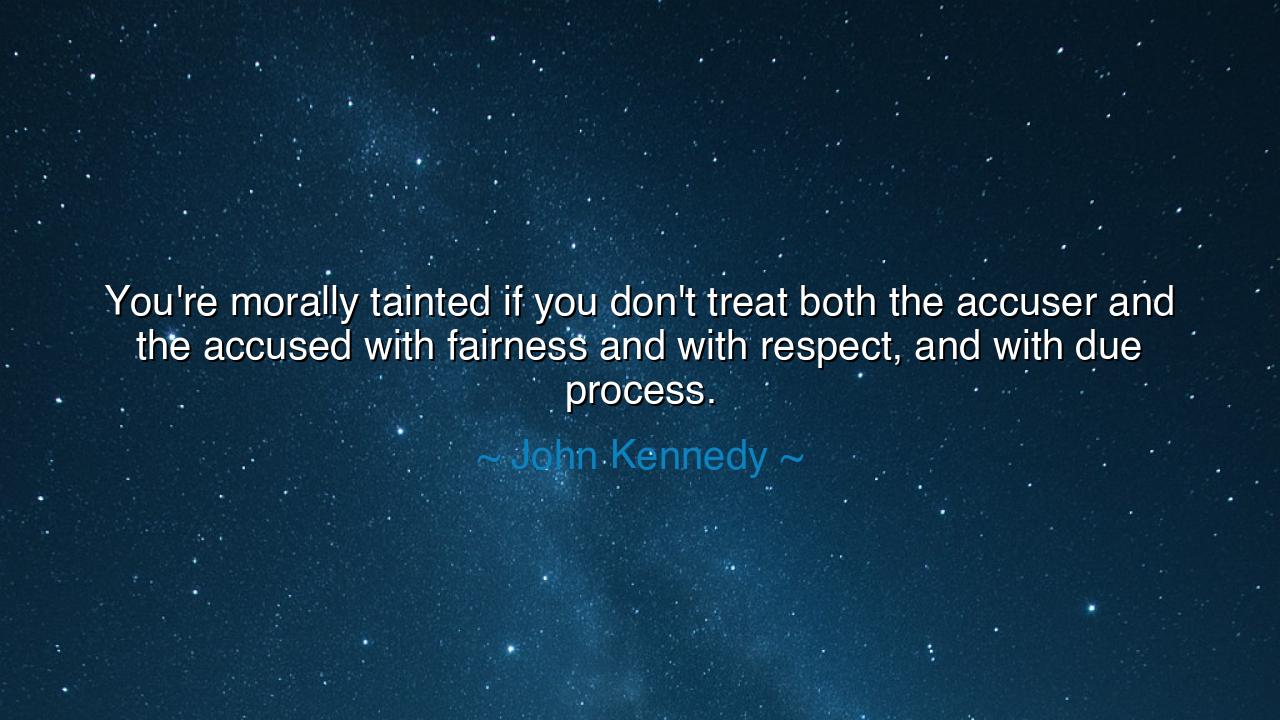
You're morally tainted if you don't treat both the accuser and
You're morally tainted if you don't treat both the accuser and the accused with fairness and with respect, and with due process.






**In the sacred halls of justice, there is a principle that must endure through the ages—the principle of fairness. When John F. Kennedy declared, "You're morally tainted if you don't treat both the accuser and the accused with fairness and with respect, and with due process," he illuminated the eternal truth that justice cannot exist without balance. The morality of a society is measured not by its ability to punish, but by its capacity to listen, to offer respect, and to guarantee fairness to all involved. This wisdom speaks not only to the heart of legal systems but to the very essence of what it means to live honorably among others.
The ancient philosophers understood that justice is the foundation upon which all great societies are built. Aristotle, in his Nicomachean Ethics, spoke of justice as the virtue that guides all others. He believed that justice is about giving every person their due, ensuring that rights are respected and that no one is above or beneath the law. In his teachings, he warned that societies must be wary of bias, for it is in the moments of decision that the true nature of a culture reveals itself. Kennedy’s words resonate with this ancient understanding, affirming that justice cannot be partial or selective—it must be universal, embracing both the accuser and the accused with equal measure.
To fail to treat both parties with respect is to invite corruption into the system. The due process Kennedy speaks of is not a mere formality, but a sacred right that demands diligence, patience, and humility. Consider the Roman Republic, which placed a great emphasis on the principle of due process. In ancient Rome, even the lowest citizen had the right to be heard in a court of law. The process was lengthy, but it was designed to ensure that justice was not tainted by emotion, vindictiveness, or power. In this way, Rome understood that morality in governance required fairness, even when it was inconvenient or uncomfortable.
This same truth can be seen in the trial of Socrates—a man who stood accused of corrupting the youth and questioning the gods of Athens. Despite the accusations against him, Socrates was granted a trial, a rare privilege in a world where many were condemned without so much as a word in their defense. While he was ultimately found guilty, the manner in which his trial was conducted reflected the Athenian belief in the importance of fairness and due process. Even in the face of adversity, Socrates insisted that true justice must always be accompanied by reason, not anger or fear. In his defense, Socrates became a symbol of the moral integrity of a society committed to the principles of justice.
Kennedy’s message is clear: when we abandon fairness in the pursuit of justice, we stain not just the individual but the society as a whole. The moral taint that Kennedy speaks of is a shadow that falls upon us all, for injustice is like a disease that infects everything it touches. It spreads beyond the courtroom and poisons the very spirit of the people. When the accuser is not heard with respect, when the accused is denied fairness, the system fails. The moral integrity of a society is only as strong as its commitment to due process—the commitment to ensuring that both sides are treated with dignity and the full measure of their rights.
In our own lives, we must seek to embody the teachings of both Kennedy and the ancient philosophers. Justice is not a tool to wield for personal gain or revenge, but a sacred duty that requires both compassion and reason. We must hold ourselves to the highest standards of fairness, ensuring that every person, regardless of their position, is given the opportunity to be heard, to defend themselves, and to be treated with respect. Whether in our personal dealings, our communities, or in positions of leadership, we must never forget that true justice does not favor the powerful or the privileged, but seeks the truth through fairness and balance.
Let us then, in all our actions, strive to practice fairness in our dealings, both large and small. When we encounter conflict, let us not rush to judgment but seek to understand, to listen, and to treat all involved with the respect they deserve. In doing so, we will not only honor the principles of justice that have been handed down through the ages, but we will also contribute to the moral strength of our society, ensuring that our actions stand as a testament to the enduring power of fairness and due process. Through this, we shall build a world where justice reigns, and the moral fabric of society remains strong.






AAdministratorAdministrator
Welcome, honored guests. Please leave a comment, we will respond soon